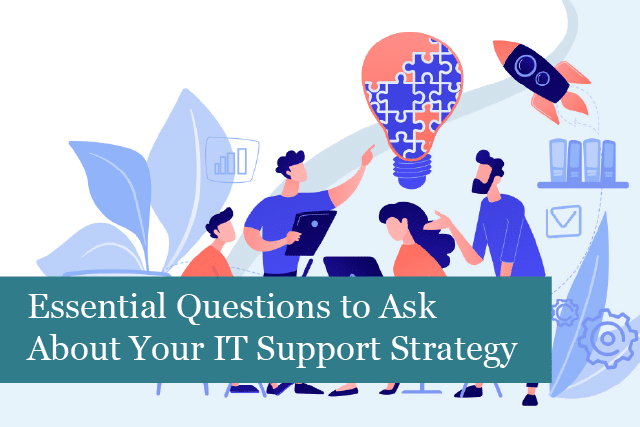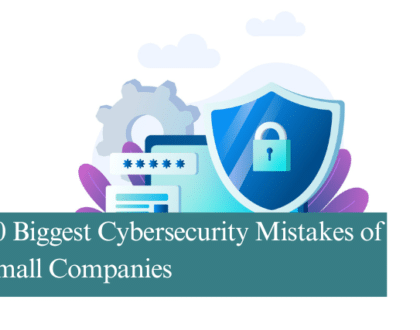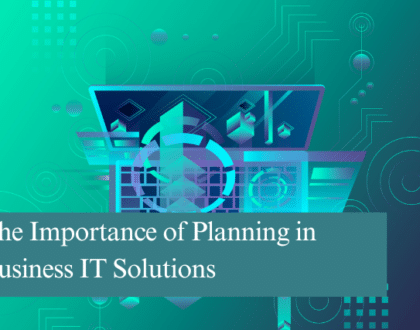
The beginning of the new year is the perfect time to sit down with your IT department and review your IT support strategy. A business that uses the right strategy can find new ways to scale, especially if they’re using the hybrid work model.
So, we’ve gathered some questions you can ask your IT support provider or in-house team to help you have a very successful new year!
How is Our Data Protected from Cyber Attacks?
Cyber security continues to be a significant concern for businesses around the world. Cybercrime continues to climb. Some types of cyberattacks are more prevalent, especially ransomware, which continues to grow. Cybercriminals are as intent as ever on breaching a company’s network to steal valuable data.
Asking your IT department how your data is protected is essential. You must know what measures are in place to protect company data, your employees, and customers.
Is Our Hardware Up to the Task?
The last couple of years has been fraught with cyber attacks and other issues. Now is the time to ensure your systems and hardware are up to the task.
Every device your business uses must be evaluated, including laptops, smartphones, tablets, and more. Companies use a wide variety of tools to stay productive and manage operations. With the advent of hybrid working, it’s imperative to ensure all devices are up to the task of keeping the company protected and scaling.
This is the right time to start an evaluation of your company’s hardware strategy. The evaluation should review everything, including basic business functions. And remember to include the team’s needs, too.
Is Our IT Strategy Aligned with Our Business Goals for the Year?
It’s tempting to view IT as something separate and distinct from the core business. However, it’s IT that supports your company’s operations and processes. IT is fast becoming a part of the heart of every business. With the right IT strategy in place, your company can experience improved employee satisfaction, see an increase in productivity, and more. However, it’s crucial to have an IT roadmap in place.
For instance, if you’d like to increase sales, it may be a good idea to invest in CRM software to track opportunities. Or what about improving productivity? In that case, you might want to consider e-learning classes to help employees do better work.
No matter what your goals are, having a tech-based strategy can help you reach it.
Is Our IT Strategy Future-Proof?
Most companies would love nothing better than to have a technical solution that could be set and forgotten. However, that’s not how things work in the real world. You can’t just assign devices, set the work, and then watch revenue increase.
The reality is that devices become obsolete, employee skills may fail, and cyberattacks will occur. That’s not a pleasant picture.
To avoid these types of issues, it’s essential to make sure your company is future-proof. Your business must have a plan to avoid these problems. This is where IT comes into play. They can create a road map with predictable milestones to make it easier to ensure your network and technology are viable today and into the future.
Is Our Business Software Strong Enough to Support Our Goals?
What about software? That’s also important when it comes to keeping your company thriving. There are more options now than ever, including DaaS, SaaS, PaaS, and more. These can make things a bit unclear; however, the best option is for a company to have a centralised system. A centralised system provides the company’s core business units rather than scattering functions across numerous platforms.
Rather than using one software for email and another for chat, why not consider using Microsoft Teams and Outlook, both of which are part of Microsoft 365? In that case, employees only sign into one account and use one infrastructure for all their tasks.
With a more unified software strategy, your business can save time on support and money. There’s no need to rely on free, unreliable software. You also don’t have to pay for multiple subscriptions. What’s more, you have instant access to apps for task management, email, cloud storage, user management, and so much more. This is robust software that can benefit your company for years to come.
Can Our IT Support Strategy Scale If the Company Grows?
As you consider your IT support strategy, it’s crucial to think about the long-term as well as the short-term. The goal is to future-proof your company, to ensure your IT department is able to scale with the company. What happens if your business suddenly goes through a growth spurt? Will your company have to struggle with only a few computers and the bare minimum of IT support?
Maintaining a scalable IT support strategy is crucial if you want the company to grow and thrive. As your company grows, it will become necessary to add new employees and set up user accounts, and more. And don’t forget about the necessary hardware, configuring security policies, and other onboarding activities.
With the right IT support strategy, your business will stay flexible enough to scale as needed and do it more smoothly and successfully.
How Prepared is Our IT Strategy for Unexpected Changes?
Along with being ready to scale, your IT strategy must also account for unexpected changes that can come along. Things can change in a matter of a few days, and your business needs to be ready for these changes.
Being prepared for the unexpected makes your business more resilient. Remember, disaster is sure to strike when you don’t have a disaster plan in place. The same applies to unexpected changes. They may not happen; however, if they do, your company will have the means to change as needed and survive in the process.
Summing It Up
What does this year hold for your company? Only time will tell! However, with the right IT support strategy in place, your company will not only survive, but it will also thrive.
Recommended Posts

How to Get the Most Out of Your IT Budget
25th April 2025

10 Biggest Cybersecurity Mistakes of Small Companies
18th April 2025

The Importance of Planning in Business IT Solutions
11th April 2025
